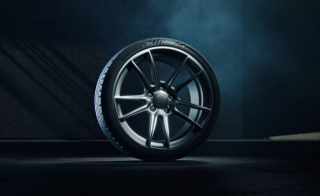With 150 years under its belt, it’s safe to say Continental has quite a story to tell, and there are some quirkier, lesser-known facts about the company that make for an interesting read…
A certain horse
It would be remiss to exclude a mention of the iconic jumping horse in the logo, that so evinces the strength, agility and endurance of not only the company but its products – he (or she) dates all the way back to 1875 and has been a constant since that time. In fact, one of the earliest items produced and distributed by the company was a hoof buffer – a special rubber used to prevent horses from slipping on icy surfaces.
A leader and a pioneer
Over the course of its illustrious history, Continental has produced many world ‘firsts’. In 1904, it was the first company in the world to develop grooved tyres for automobiles. Other firsts in production include the first ever patterned tyre tread and the first ever tubeless tyre, as well the world’s first eco-friendly tyre and the world’s fastest road legal tyre. Continental also produced the world’s first ever driverless car in 1968!
The Middle East can also share in Continental’s list of firsts – 2018 saw the launch of the Generation 6, the first range of tyres specifically designed and produced for the region’s climate and driving conditions. In late 2021, the SportContact 7 tyre was introduced, soon to be followed by more in the Generation 7 stable.
Continental doesn’t limit itself to the tarmac either: in 1909 French aviator, Louis Bleriot was the first to fly the English Channel. The flying surfaces on his mono plane were covered with Conti ‘Aeroplan’ material.
More than tyres
Continental is one of the largest automotive manufacturers in the world – also producing brake systems; systems and components for powertrains and chassis; instrumentation; infotainment solutions; vehicle electronics; and technical elastomers.
And now about those dandelions
Always researching and innovating, 2011 saw Continental focussing on the development of an alternative natural material for tyre production – notably, a very high-yield and hardy type of dandelion based on a Russian variety of the plant. The first Continental tyre with a tread made of dandelion rubber was produced in 2014. This ground-breaking development means the company’s tyres are now more sustainable in several ways – landfill waste and microplastic pollution are reduced, as well as the geographical limitations and market volatility attributed to use of the rubber from traditional plantations. This important new and natural rubber and its adoption has received a multitude of awards in the fields of sustainability and technology.
Always spicing things up
Black chili is another innovation from Continental and following on from dandelions, one can grasp just how far outside the proverbial box the company will go to keep forging the way ahead for sustainability and modernisation. Black Chili is a combination of the very latest polymers with specially developed carbon black particles and filler materials – resulting in a revolutionary tyre tread suitable for both cars and bikes. Known for its superior grip, rolling resistance and mileage on the road, the Black Chili tread compound has also been adopted by the professional cycling elite in many of the Tour de France teams.
With 150 years of experience and growth, not to mention a magnificent array of stories and anecdotes gathered along the way, Continental will continue its amazing journey well into the future with promises of many more surprises and innovations on the horizon.



